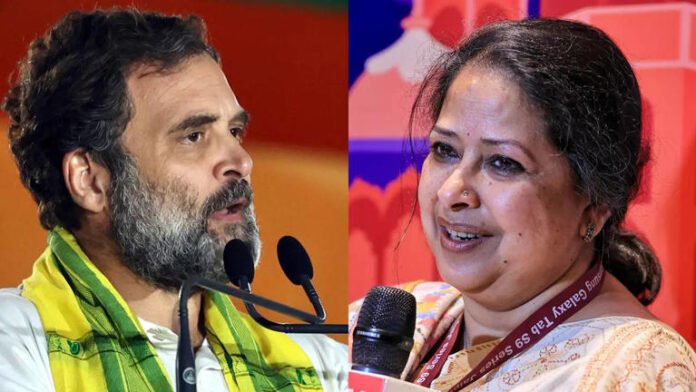In a significant departure from the entrenched dynastic politics that have long defined the Indian National Congress, Sharmistha Mukherjee, daughter of former President Pranab Mukherjee, has issued a clarion call for the party to transcend its reliance on the Nehru-Gandhi family. With the 2024 Lok Sabha elections looming on the horizon, Mukherjee’s message underscores the urgent need for the Congress to embrace a more democratic and merit-based approach in selecting its leadership.
For decades, the Congress party has been synonymous with the Nehru-Gandhi dynasty, with members of the family occupying the highest echelons of power within the organization. While this may have served the party well in the past, Mukherjee rightly argues that clinging to the dynasty’s legacy risks stagnation and alienating voters who seek fresh faces and ideas.
In her statement, Mukherjee urges the Congress leadership to engage in introspection and consider who should represent the party in the upcoming elections. This reflects a growing recognition within the party that it must adapt to the changing political landscape and connect with voters on issues that matter to them.
Mukherjee’s advocacy for a more inclusive and meritocratic approach to leadership selection is not just a call for change; it is a recognition of the realities of modern Indian politics. As the country undergoes rapid socio-economic transformation, voters are increasingly looking for leaders who can address their concerns and aspirations, regardless of their last name.
Moreover, with the rise of regional parties and the emergence of new political forces, the Congress cannot afford to rely solely on the Nehru-Gandhi brand to secure electoral success. To remain relevant, the party must cultivate a diverse leadership bench that reflects the pluralistic nature of Indian society and resonates with voters across the country.
Critics may argue that the Nehru-Gandhi family’s legacy is integral to the Congress’s identity and electoral appeal. While it is undeniable that the family has played a pivotal role in shaping the party’s history, clinging to the past at the expense of embracing change is a recipe for obsolescence.
In this regard, Mukherjee’s message should be seen as an opportunity rather than a threat. By opening up the party’s leadership selection process to a wider pool of talent, the Congress can tap into the expertise and energy of a new generation of leaders who are ready to take on the challenges of the 21st century.
Furthermore, by breaking free from the shackles of dynasty, the Congress can reclaim the moral high ground and differentiate itself from its political rivals. At a time when public trust in political institutions is at an all-time low, demonstrating a commitment to internal democracy and meritocracy can help the Congress rebuild its credibility and inspire confidence among voters.
Of course, transitioning to a post-dynastic era will not be without its challenges. It will require the Congress to undertake a process of organizational renewal, fostering a culture of transparency, accountability, and inclusivity within the party ranks.
Additionally, the Congress leadership must be willing to embrace innovation and experimentation in its approach to governance and policymaking. By harnessing the collective wisdom and talent of its members, the party can develop a bold and visionary agenda that addresses the pressing issues facing the country, from economic inequality to climate change.
Ultimately, Mukherjee’s call for the Congress to look beyond the Nehru-Gandhi family is a timely reminder that political parties must evolve or risk becoming relics of the past. As India stands at a crossroads, grappling with the challenges of the 21st century, the Congress has an opportunity to redefine itself as a dynamic and forward-thinking force for progress and change.
The 2024 Lok Sabha elections will be a crucial test for the Congress, but it is also an opportunity for the party to chart a new course and reclaim its rightful place as the vanguard of India’s democratic ideals. It is time for the Congress to embrace the future with confidence and conviction, leaving behind the ghosts of the past and embracing a new era of leadership and renewal.

